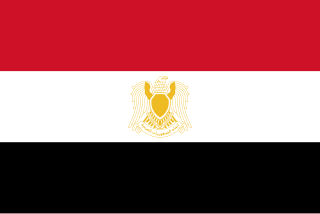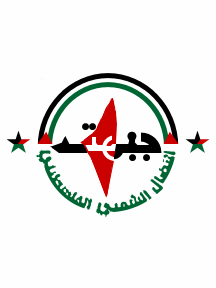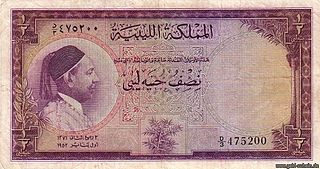| |||||
| Decades: | |||||
|---|---|---|---|---|---|
| See also: | Other events of 1971 List of years in Libya | ||||
The following lists events that happened in 1971 in Libya .
| |||||
| Decades: | |||||
|---|---|---|---|---|---|
| See also: | Other events of 1971 List of years in Libya | ||||
The following lists events that happened in 1971 in Libya .

Libya, officially the State of Libya, is a country in the Maghreb region of North Africa. It borders the Mediterranean Sea to the north, Egypt to the east, Sudan to the southeast, Chad to the south, Niger to the southwest, Algeria to the west, and Tunisia to the northwest, as well as maritime borders with Greece, Italy and Malta to the north. Libya comprises three historical regions: Tripolitania, Fezzan, and Cyrenaica. With an area of almost 1.8 million km2 (700,000 sq mi), it is the fourth-largest country in Africa and the Arab world, and the 16th-largest in the world. Libya claims 32,000 square kilometres of southeastern Algeria, south of the Libyan town of Ghat. The country's official religion is Islam, with 96.6% of the Libyan population being Sunni Muslims. The official language of Libya is Arabic, with vernacular Libyan Arabic being spoken most widely. The majority of Libya's population is Arab. The largest city and capital, Tripoli, is located in northwestern Libya and contains over a million of Libya's seven million people.

Muammar Muhammad Abu Minyar al-Gaddafi was a Libyan revolutionary, politician and political theorist who ruled Libya from 1969 until his assassination by rebel forces in 2011. He came to power through a military coup, first becoming Revolutionary Chairman of the Libyan Arab Republic from 1969 to 1977 and then the 'Brotherly Leader' of the Great Socialist People's Libyan Arab Jamahiriya from 1977 to 2011. Initially ideologically committed to Arab nationalism and Nasserism, Gaddafi later ruled according to his own Third International Theory.

In the first Gulf of Sidra incident, 19 August 1981, two Libyan Su-22 Fitters fired upon two U.S. F-14 Tomcats and were subsequently shot down off the Libyan coast. Libya had claimed that the entire Gulf was their territory, at 32° 30′ N, with an exclusive 62-nautical-mile fishing zone, which Libyan leader Muammar Gaddafi asserted as "The Line of Death" in 1973. Two further incidents occurred in the area in 1986 and in 1989.

The Federation of Arab Republics was an unsuccessful attempt by Muammar Gaddafi to merge Libya, Egypt and Syria in order to create a unified Arab state. Although approved by a referendum in each country on 1 September 1971, the three countries disagreed on the specific terms of the merger. The federation lasted from 1 January 1972 to 19 November 1977.

The Palestinian Popular Struggle Front is a Palestinian political party. Samir Ghawshah was elected secretary-general of PPSF in 1971 and led it until his death in 2009. He was succeeded by Ahmed Majdalani on 8 August 2009.

The Libyan pound was the currency of Libya between 1951 and 1971. It was divided into 100 piastres and 1000 milliemes (مليم).

Muammar Gaddafi became the de facto leader of Libya on 1 September 1969 after leading a group of young Libyan Army officers against King Idris I in a bloodless coup d'état. After the king had fled the country, the Revolutionary Command Council (RCC) headed by Gaddafi abolished the monarchy and the old constitution and established the Libyan Arab Republic, with the motto "freedom, socialism and unity". The name of Libya was changed several times during Gaddafi's tenure as leader. From 1969 to 1977, the name was the Libyan Arab Republic. In 1977, the name was changed to Socialist People's Libyan Arab Jamahiriya. Jamahiriya was a term coined by Gaddafi, usually translated as "state of the masses". The country was renamed again in 1986 as the Great Socialist People's Libyan Arab Jamahiriya, after the United States bombing that year.

Al-Ahly Sports Cultural and Social Club, known as Al-Ahly SCSC, is a Libyan sports club based in Benghazi. Al-Ahly SC has its roots in a political party, the Omar al Mukhtar society.

Libya was a colony of Fascist Italy located in North Africa, in what is now modern Libya, between 1934 and 1943. It was formed from the unification of the colonies of Cyrenaica and Tripolitania, which had been Italian possessions since 1911.
The following outline is provided as an overview of and topical guide to Libya:

Italian Libyans are Libyan-born citizens who are fully or partially of Italian descent, whose ancestors were Italians who emigrated to Libya during the Italian diaspora, or Italian-born people in Libya. Most of the Italians moved to Libya during the Italian colonial period.
The 1971–72 Libyan Premier League was the 8th edition of the competition since its inception in 1963.

The anti-Gaddafi forces, also known as the Libyan opposition or Libyan rebels, were Libyan groups that opposed and militarily defeated the government of Muammar Gaddafi during the First Libyan Civil War in 2011, killing him in the process. The Anti-Gaddafi forces were represented by the National Transitional Council and their National Liberation Army, which claimed to be the "only legitimate body representing the people of Libya and the Libyan state". These opposition forces included organized and armed militia groups, participants in the Libyan Civil War, Libyan diplomats who switched their allegiance from the Gaddafi-led government, and Libyan military units that switched sides to support the protesters.

Moussa Ibrahim Gaddafi is a Libyan political figure who rose to international attention in 2011 as Muammar Gaddafi's Information Minister and official spokesman, serving in this role until the government was toppled the same year in the Libyan Civil War. Ibrahim held frequent press conferences in the course of the war, denouncing rebel forces and the NATO-led military intervention, often in defiant and impassioned tones. His status and whereabouts remained unknown following the Battle of Tripoli in which the Gaddafi government was overthrown, although there were several claims and subsequent refutations of his capture. Eventually, in late 2014, it was discovered he was in Egypt before he was deported and fled to Serbia. On 12 January 2015 Moussa Ibrahim spoke publicly by video link at a political event hosted at the Committee Rooms Houses of Parliament, Westminster, London from an undisclosed location, also the Director of Private Security Company.

The Battle of Sirte refers to the battle in the spring of 2015, in the region of Sirte, Libya, between the Islamic State of Iraq and the Levant (ISIL) and the Libya Shield Force. ISIL forces had been present in the city since February 2015, before the Fall of Nofaliya. After Nofaliya fell to ISIL forces, the Tripoli-based government had decided to send reinforcements to recapture Sirte.
The following lists events that happened in 1973 in Libya.
The following lists events that happened in 1972 in Libya.
The following lists events that happened in 1975 in Libya.
Events in Libya in 2020
Events in Libya in 2022.